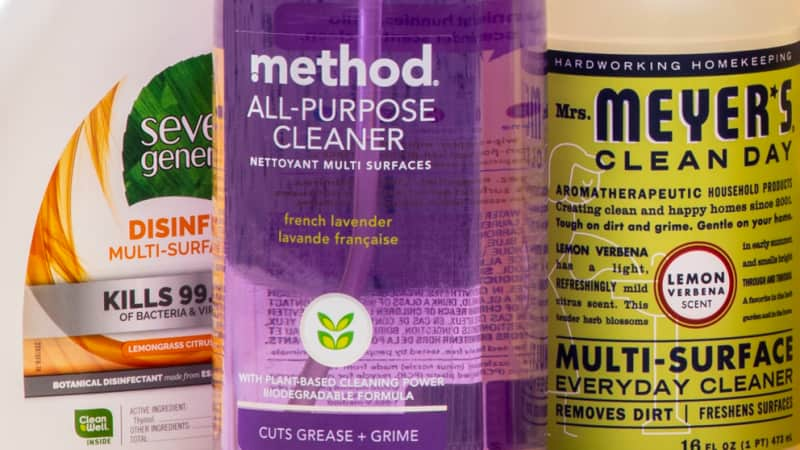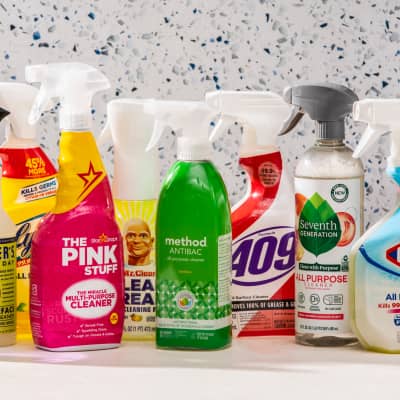Multipurpose sprays are fantastic at scrubbing away tough stains, but many products contain chemicals most of us can’t even pronounce. Several brands—from the environmentally-minded Mrs. Meyer’s Clean Day and Seventh Generation to more conventional brands such as Clorox, Lysol, and Mr. Clean—fight this confusion by touting their “natural” ingredients and promising that they’re simpler, safer alternatives.
Is Your “Natural” Cleaner Even Doing Anything?
Published May 26, 2023.

But are they?
I’ve spent the last six months testing, researching, and cleaning countless messes with 20 multipurpose cleaning sprays. I’ve interviewed experts (including cleaning lab directors, public health researchers, and industrial chemists); led testing in our gigantic test kitchen and within several users’ homes; and cleaned my own microwave about four dozen times (in the name of science!). I’ve also worked with an ISO-accredited lab to test these products’ cleaning and disinfecting power.
Here's what I've learned about "natural" cleaners and their effectiveness.
Sign up for the Well-Equipped Cook newsletter
Shop smarter with our ATK Reviews team's expert guides and recommendations.
What Does “Natural” Even Mean?
What constitutes a “natural” cleaner is hard to define. Most of the terms cleaning brands slap on their labels are unregulated. You may see the phrases “naturally derived” or “environmentally friendly” to imply that ingredients are less harmful to users or the environment. Mrs. Meyer’s eschews these for “cruelty-free,” “garden-inspired scents,” and “thoughtfully chosen” ingredients. Seventh Generation markets its “botanical” scents and fragrances from essential oils.
Popular ingredients in most conventional sprays, such as quaternary ammonium compounds (also called quats or QACs), have been shown in scientific research to exacerbate skin, eye, and lung conditions or damage our natural environment, and gentler ingredients are tempting for many consumers.
But not all “natural” cleaners are created equal. Here are the top three things to look for when shopping for a more natural product.
- Look for the EPA Safer Choice label. According to Dr. Jason Marshall, the director of the cleaning lab at UMASS Lowell’s Toxic Use Reduction Institute (TURI), this is the easiest way to identify a product that is less likely to irritate asthma or skin conditions. The EPA regulates use of this label and gives it to products whose manufacturers submit their formulas for voluntary review. Ingredients and total pH must be safe for you, your children, your pets, and other loved ones; as well as the environment, including marine life that may encounter it downstream.
- Avoid quats. Not all companies choose to be reviewed by the EPA, so another easy way to tell if a product is free of harsh chemicals like quaternary ammonium compounds is to check the label. The most common things to look for are Didecyl dimethyl ammonium chloride (DDAC) and Alkyl dimethyl benzyl ammonium chloride (ADBAC). If you see those ingredients, you'll want to steer clear.
- Look for citric acid instead. TURI assembled a list of safer disinfectants, which includes our antimicrobial winner from Method. It uses citric acid, which is a safer choice than quats.
The Best Multipurpose Spray Cleaners
We spent weeks cleaning and disinfecting counters, appliances, cabinets, and more. Our mission? Find a spray we could count on.Do “Natural” Cleaners Work Well?
As usual, it depends!
First, it depends on whether you’re cleaning or sanitizing. In short, cleaning dissolves messes and physically removes germs. Sanitizing and disinfecting actually chemically kill germs.
Most of the time, you should only be using a multipurpose spray to clean, because it gets rid of the majority of germs and exposes you to fewer harsh chemicals. Soap and water or multipurpose cleaning sprays without antimicrobial (germ-killing) products, such as our winner from Method, are perfect for this process. Our winner contains gentle detergents that are less harmful for you (and the fish) but cleans stains better than any other product we tested. So, yes! Gentler products can help you tackle tough messes.
But can a “gentle” or “natural” product actually kill germs? Yes, again!
In a side-by-side laboratory test, we tested whether the citric acid-based formula in our winning antimicrobial spray from Method could neutralize salmonella as effectively as a popular quat-filled spray from Lysol.
Method performed just as well, and this was corroborated in additional testing from TURI. Products with citric acid, hypochlorous acid, hydrogen peroxide, and a few other active ingredients can kill germs effectively while reducing the risk of harmful health effects.
In short, you can rely on a “gentler” or more “natural” cleaner for your cleaning and disinfecting needs, as long as you do your research and choose the right one.
